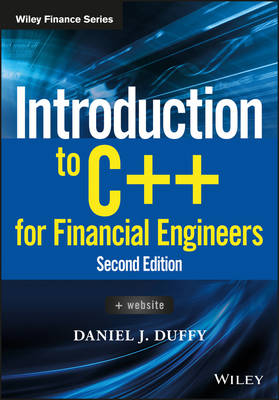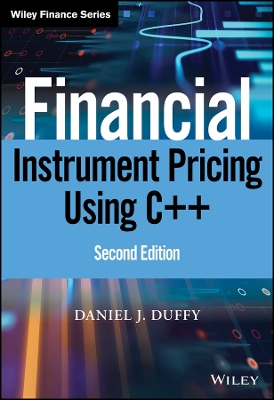The Wiley Finance
1 primary work • 2 total works
Book 404
Introduction to C++ for Financial Engineers, Second Edition uses the new and improved language features and multi–paradigm programming styles to create robust and flexible code for a number of important areas in finance. Each chapter has been written to be as self–contained as possible, while taking account of the most recent developments in software design, programming styles and advances in desktop hardware.
This resource is written for Quant developers versed in creating applications using C++98. It shows how to define, design and implement flexible applications using modern software design methods in C++. Developers will learn how to:
- Adopt a standardised design methodology (based on domain architectures) for applications
- Write clear and maintainable code in the `gold standard′ C++ language
- Move from C++98 to next–generation C++11, C++ 14 and later
- Use C++ and Boost libraries instead of home–grown code
- Create multi–threaded and parallel applications
- Utilise applications to lattices, PDE and Monte Carlo models
The chapters in this book begin with simple examples, transitioning to more extensive models and finance–related applications. Each chapter concludes with exercises and projects, allowing the reader to monitor progress by reviewing what has been discussed and writing code based on those concepts.
- New C++ syntax, language features and libraries
- Building flexible lattice models using the domain architecture approach
- Detailed discussion of PDE/Finite Difference Method for European and American option pricing
- C++ Concurrency, multithreading and parallel libraries for multi–core CPUs and GPUs
- Numerical solution of stochastic differential equations and Monte Carlo option pricing
- Optimal use of the combined object–oriented, template and functional programming styles
Introduction to C++ for Financial Engineers, Second Edition assembles many of the design and language features to help you create flexible and maintainable applications.
This complete guide to C++ and computational finance is a follow-up and major extension to Daniel J. Duffy's 2004 edition of Financial Instrument Pricing Using C++. Both C++ and computational finance have evolved and changed dramatically in the last ten years and this book documents these improvements. Duffy focuses on these developments and the advantages for the quant developer by:
- Delving into a detailed account of the new C++11 standard and its applicability to computational finance.
- Using de-facto standard libraries, such as Boost and Eigen to improve developer productivity.
- Developing multiparadigm software using the object-oriented, generic, and functional programming styles.
- Designing flexible numerical algorithms: modern numerical methods and multiparadigm design patterns.
- Providing a detailed explanation of the Finite Difference Methods through six chapters, including new developments such as ADE, Method of Lines (MOL), and Uncertain Volatility Models.
- Developing applications, from financial model to algorithmic design and code, through a coherent approach.
- Generating interoperability with Excel add-ins, C#, and C++/CLI.
- Using random number generation in C++11 and Monte Carlo simulation.
Duffy adopted a spiral model approach while writing each chapter of Financial Instrument Pricing Using C++ 2e: analyse a little, design a little, and code a little. Each cycle ends with a working prototype in C++ and shows how a given algorithm or numerical method works. Additionally, each chapter contains non-trivial exercises and projects that discuss improvements and extensions to the material.
This book is for designers and application developers in computational finance, and assumes the reader has some fundamental experience of C++ and derivatives pricing.
HOW TO RECEIVE THE SOURCE CODE
Once you have purchased a copy of the book please send an email to the author dduffyATdatasim.nl requesting your personal and non-transferable copy of the source code. Proof of purchase is needed. The subject of the mail should be “C++ Book Source Code Request”. You will receive a reply with a zip file attachment.

